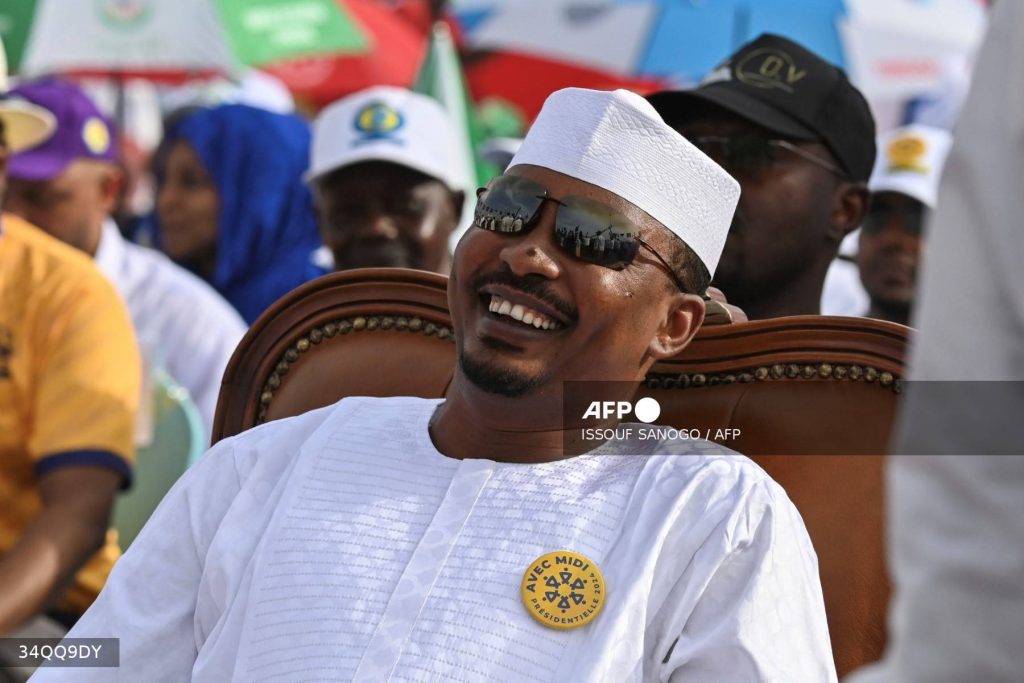Chadians are casting their votes for a president on Monday in an election that is supposed to end military rule. However, opponents of junta leader, Mahamat Idriss Deby, believe it is not fair after violent repression.
People will decide whether to continue the decades-long rule of the Deby family in one of the world’s poorest countries, which is crucial in the fight against extremism across the Sahel desert region.
Voters have the option to choose Deby’s prime minister, Succes Masra, who is criticized by opponents for being a puppet in the absence of any other serious challengers.
During his final campaign rally on Friday, Deby promised a decisive victory in the first round.
Masra also pledged to win without a run-off, telling his supporters that Chad will belong to the people for the first time.
International human rights groups have cautioned that the election will not be fair because Deby’s main rival has been killed and others have been prohibited from running for office.
– Military rule –
Generals appointed Deby as the transition leader in 2021 after his father, longtime president Idriss Deby Itno, was killed in a battle with rebels following 30 years in power.
Known as MIDI and “the Man in Dark Glasses”, Mahamat initially promised an 18-month transition to democracy, but later extended it by two years.
Opposition figures have either fled, been silenced, or joined forces with Deby, while the junta has thwarted any efforts by civil society to campaign against it.
On October 20, 2022, the army and police fired on demonstrators protesting the extension of the transition, including members of Masra’s party, the Transformers.
According to international NGOs, at least 300 young people died, but the regime claims the number is around 50.
Deby’s cousin and chief election rival Yaya Dillo Djerou was shot at close range in the head during an army attack on February 28, according to his party.
Masra was among the opposition who were forced out of the country but later returned, and he was appointed prime minister in January.
The eight other candidates, who are not well-known or seen as non-hostile to the regime, are not expected to garner many votes.
– Not ‘free or democratic’ –
The International Federation for Human Rights cautioned on Friday that the election seems “neither credible, free nor democratic”.
It pointed out “increasing human rights violations” in the country, including Dillo’s killing.
The International Crisis Group (ICG) warned that “a number of problems in the run-up to the balloting cast doubt on its credibility”.
These problems include measures that only allow officials to release regional vote tallies instead of posting the results at individual polling stations, making it impossible for observers to verify the vote count.
ICG also mentioned the decision by Chad’s Constitutional Council to exclude 10 rival candidates from the vote in Deby strongholds.
As for Masra, it stated: “A significant proportion of his constituency now considers him to have become a stooge of those in power” — although some analysts have suggested that Masra may genuinely aim to become president.
ICG and FIDH questioned the independence of the council and another key electoral body, the National Election Management Agency (ANGE).
– Poverty motivates people to vote –
More than 8.2 million individuals are registered to vote in the central African nation, which is ranked by the United Nations as the fourth least-developed country globally.
In a nation where thirty percent of the population are between the ages of 10 and 24, a new group of voters will be participating in the electoral process for the first time.
Idriss Amidou, a 26-year-old literature student in the capital N’Djamena, believes that Deby “is the only candidate who offers any hope” and the ruling family “knows how to run the country”.
However, Eric Bendiguim, a 25-year-old law student at N’Djamena University, stated that his first-ever vote would go to Masra.
“MIDI has already failed,” he said.
“We don’t have roads. We don’t have electricity. We don’t have good schools. We don’t have enough to eat. It’s really distressing.”
Voting stations throughout Chad’s extensive mostly desert region will open from 6:00 am (0500 GMT) to 5:00 pm (1600 GMT).
Results are anticipated on May 21, with a potential second round on June 22.
AFP



